 Server
Colocation
Server
Colocation
 CDN
Network
CDN
Network
 Linux Cloud
Hosting
Linux Cloud
Hosting
 VMware Public
Cloud
VMware Public
Cloud
 Multi-Cloud
Hosting
Multi-Cloud
Hosting
 Cloud
Server Hosting
Cloud
Server Hosting
 Kubernetes
Kubernetes
 API Gateway
API Gateway

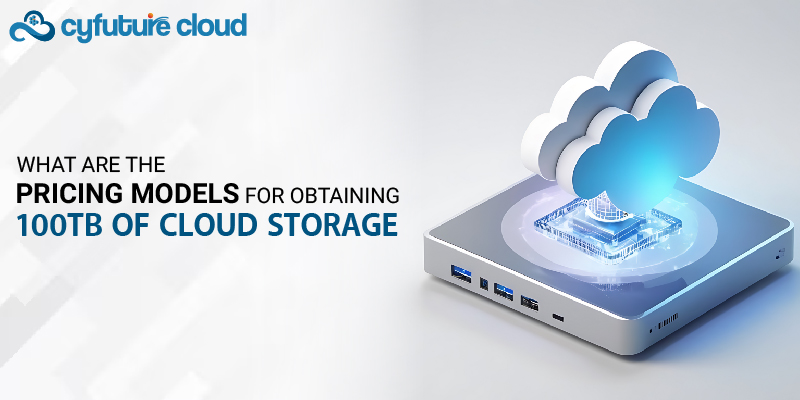
Today, as the amount of information increases more and more, companies, as well as people have the requirements for extensive storage. Presently, cloud storage has become vital to anyone who needs to store extremely vast data capacity perhaps of about 100 TB. However, with so many choices of providers and so many different pricing strategies, how then does one work out that to get the best cost for their money, they should be paying for 100TB of storage?
We can start by describing various types of pricing models and also give an example of some of the market leaders.
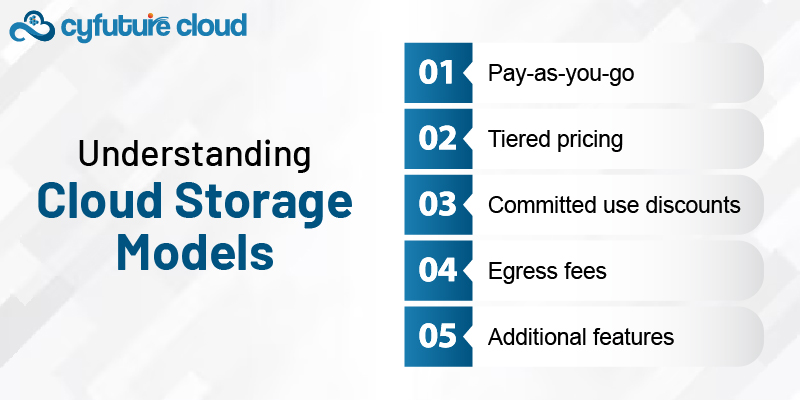
Before we examine specific providers, it's crucial to understand the common pricing models for cloud storage:
1. Pay-as-you-go: Charges are made on the actual storage and data transmission, depending on the hour or month.
2. Tiered pricing: Different storage classes (hot, cool, archive) are available at different prices, depending on the premier's probability and performance requirements.
3. Committed use discounts: Customers can get actual KWH charges at a discounted price based on their commitment to use a minimum amount of storage in a given fiscal year, which can range from one to three years.
4. Egress fees: Fees levied every time data is moved out of the storage process, commonly decided by the destination and frequency.
5. Additional features: Costs for extra services like enhanced security, data redundancy, or specific APIs.
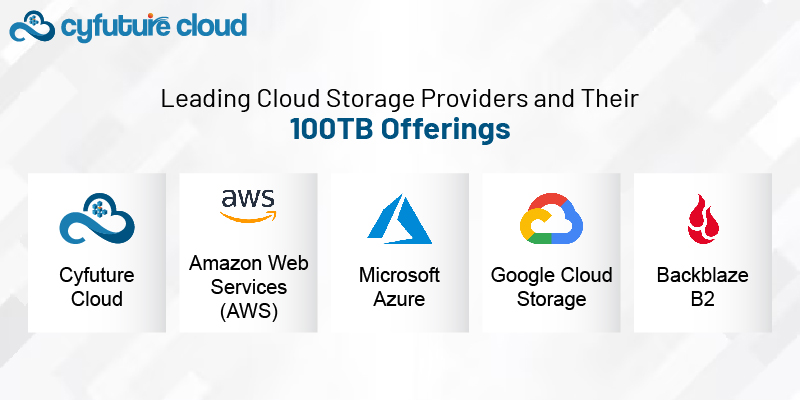
Now, let's examine some of the major cloud storage providers and their pricing for 100TB of storage:
Cyfuture Cloud stands out with its competitive pricing and robust features: Flexible storage plans tailored to your needs Enterprise-grade security and performance Custom pricing for high-volume storage ensuring cost-effectiveness Cyfuture Cloud offers a blend of affordability, reliability, and comprehensive features, making it an excellent choice for managing your 100TB cloud storage efficiently."
2. Amazon Web Services (AWS)
AWS offers several storage classes through its Simple Storage Service (S3):
- S3 Standard: ~$2,300/month
- S3 Intelligent-Tiering: Starting at ~$2,300/month, with potential savings based on access patterns
- S3 Glacier Deep Archive: ~$400/month, but with higher retrieval costs and longer access times
AWS also provides volume discounts and reserved capacity pricing for long-term commitments, potentially reducing costs further.
Azure's pricing for 100TB varies based on redundancy and access tier:
- Hot tier with locally redundant storage (LRS): ~$2,200/month
- Cool tier with LRS: ~$1,100/month
- Archive tier with LRS: ~$400/month
Azure offers reserved capacity discounts for 1-year or 3-year commitments, which can lead to significant savings.
4. Google Cloud Storage
Google Cloud's pricing for 100TB depends on the chosen storage class:
- Standard Storage: ~$2,000/month
- Nearline Storage: ~$1,000/month
- Coldline Storage: ~$700/month
- Archive Storage: ~$400/month
Google also provides committed use discounts and custom pricing for high-volume customers.
5. Backblaze B2
Backblaze offers a simpler pricing model:
- $500/month for 100TB, with no tiering complexities
This makes Backblaze an attractive option for those seeking straightforward pricing without managing multiple storage tiers.
6. Wasabi
Wasabi provides a single tier of storage:
- $599/month for 100TB
Like Backblaze, Wasabi's simplicity can be appealing, especially for users who don't need complex tiering options.
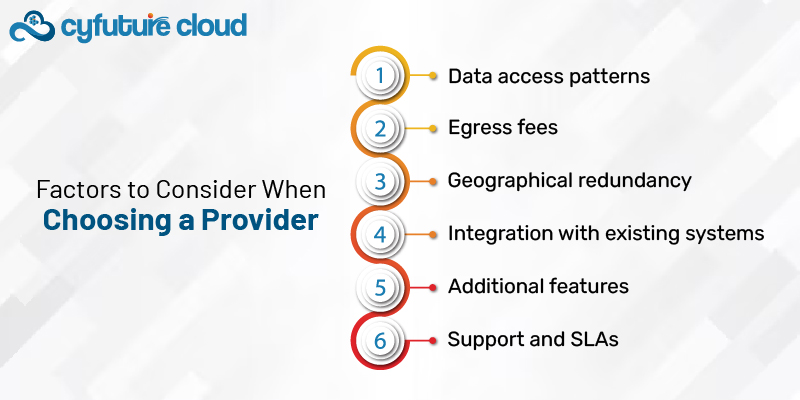
While price is a crucial factor, it shouldn't be the only consideration when selecting a cloud storage provider for your 100TB needs. Other important factors include:
1. Data access patterns: If you frequently access your data, a hot storage tier might be more cost-effective despite higher upfront costs. Conversely, if data is rarely accessed, cold or archive storage could provide significant savings.
2. Egress fees: These can add up quickly, especially if you transfer large amounts of data out of the cloud frequently. Some providers, like Wasabi, offer egress-free plans.
3. Geographical redundancy: While locally redundant storage is cheaper, geographically redundant options provide better data protection, which might be crucial for your use case.
4. Integration with existing systems: Consider how well the storage solution integrates with your current infrastructure and workflows.
5. Additional features: Evaluate the provider's offerings in terms of security, data management tools, and API accessibility.
6. Support and SLAs: Assess the level of support provided and the guaranteed uptime in the service level agreements (SLAs).
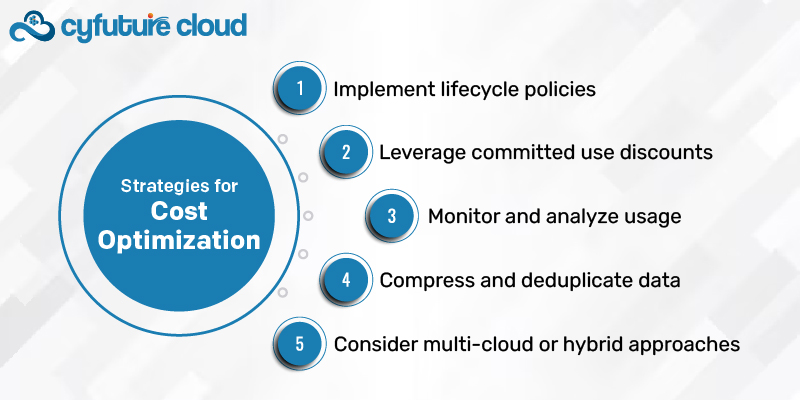
To make the most of your 100TB cloud storage investment, consider these cost-optimization strategies:
1. Implement lifecycle policies: What is the ‘memorate ? Automatically migrate data between storage classes depending on access frequency to save.
expenses.
2. Leverage committed use discounts: That appears more true if the storage demands are more or less unchanging because then, leveraging long run contracts would be equitable financially.
3. Monitor and analyze usage: It is recommended that one should try to monitor the storage requirements and the expenditures at fixed intervals.
4. Compress and deduplicate data: Optimize the amount of data stored, by using data compression and/or deduplication.
5. Consider multi-cloud or hybrid approaches: It was also found that costs and performance could be improved through the use of multiple providers or structured storage between in-house and cloud services.
When selecting the most suitable option, review the exact needs, compare the value of egress fees along with potential growth, and negotiate with the providers if the data storage volume is high. Remember that the lowest price is not always the best – consider the quality of work done by the firm, efficiency, and other amenities they provide.
Cyfuture Cloud combines low cost, high service reliability, and welcome features to be suitable for the high volume storage needs of your 100TB effective cloud storage space.
Regarding the current situation in the cloud storage market, pay attention to new entrants and advancements, which can offer you even cheaper solutions for your 100TB storage in the future.

Let’s talk about the future, and make it happen!
By continuing to use and navigate this website, you are agreeing to the use of cookies.
Find out more


